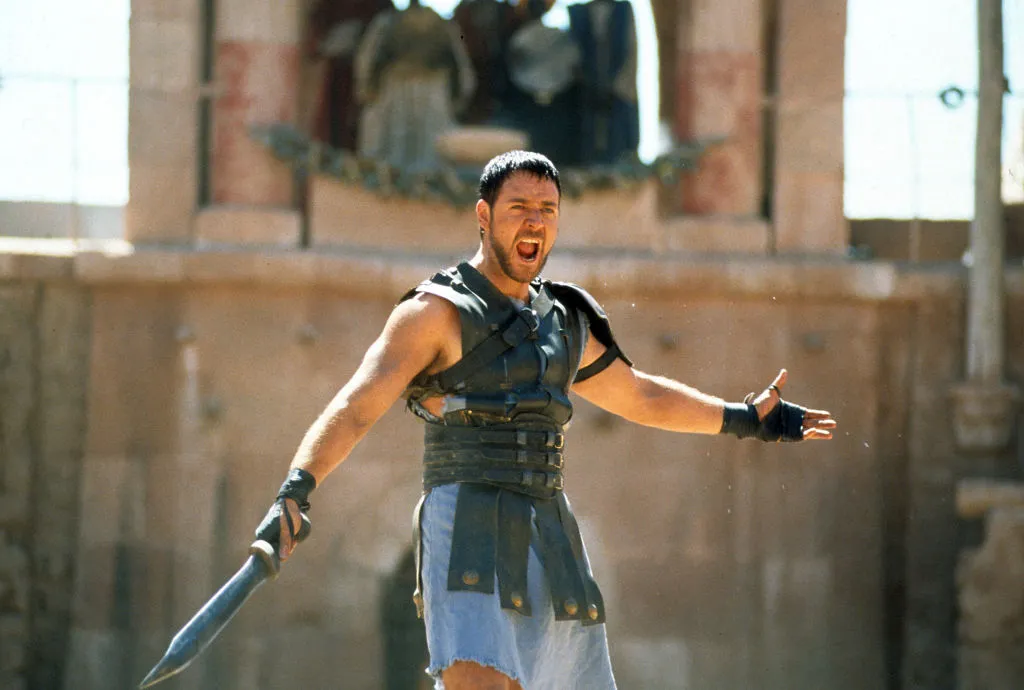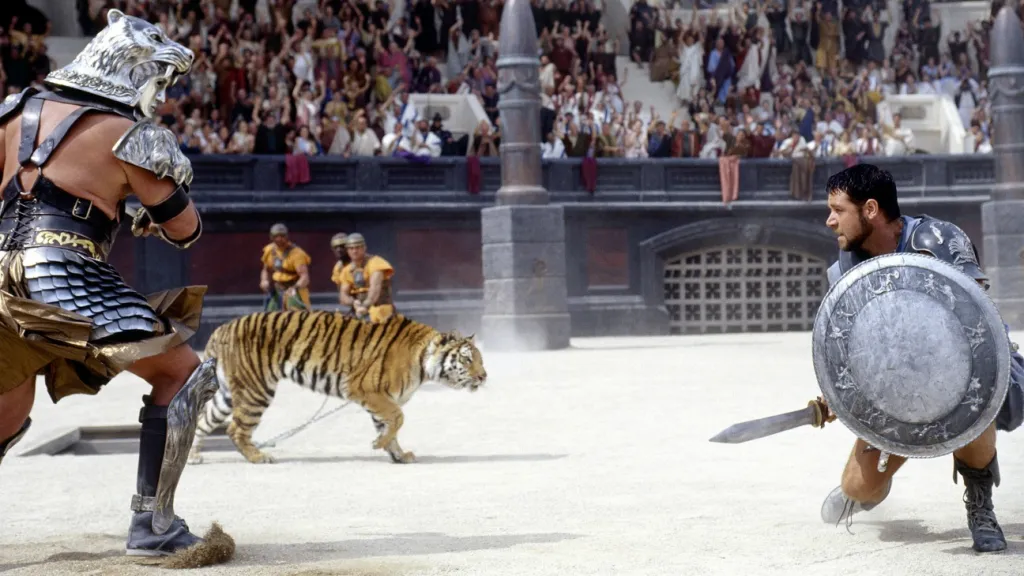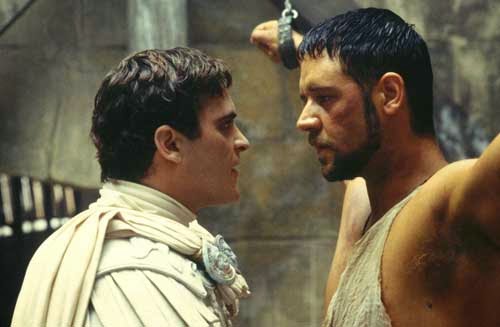Gladiator (2000)

DIRECTOR: Ridley Scott
CAST: Russell Crowe, Joaquin Phoenix, Connie Nielsen, Djimon Hounsou, Oliver Reed, Richard Harris, Derek Jacobi, Tomas Arana, Spencer Treat Clark, Tommy Flanagan, Ralf Moeller, David Schofield, John Shrapnel, David Hemmings, Sven-Ole Thorsen
REVIEW:
Gladiator is the first sword-and-sandals epic in four decades, hearkening back to epic spectacle on a scale seldom mounted while updating the Roman epic with modern effects (and modern violence). To that end, Gladiator might attract both fans of Spartacus and those who appreciate the likes of Braveheart, and combines spectacle, action, and a stirring narrative into a rousing and dynamic film.
In 180 AD, with the Roman Empire at the height of its power, General Maximus (Russell Crowe) smashes the final German stronghold standing in the way of Roman victory for his beloved, fading Emperor Marcus Aurelius (Richard Harris), who looks on him as a son. So close is their relationship, in fact, that Aurelius intends for Maximus to assume his powers upon his death to safeguard Rome’s transition from Imperial dictatorship back to the Republic it was founded as, but this doesn’t sit well with Aurelius’ son Commodus (Joaquin Phoenix). When he learns his father’s intentions, Commodus first murders the Emperor in a fit of grief and rage, then sentences Maximus and his family to death when the honorable General refuses to pledge allegiance to him. Making a narrow escape from his executioners but too late to save his wife and young son, the distraught and exhausted Maximus is picked up by a band of slave traders who spirit him away to a remote Roman province, where he is trained as a gladiator under the auspices of Proximo (Oliver Reed in his final film role). Forced to slaughter other gladiators in the arena to the entertainment of the crowd, Maximus has only one goal: to eventually make his way to Rome to confront Commodus and avenge his family.
While Gladiator uses a couple historical figures—-Marcus Aurelius and his son Commodus—-and a handful of basic facts (Commodus was an enthusiastic patron of the Colosseum gladiatorial games and is generally regarded as one of the worst Roman Emperors) for a thin skeletal framework, it takes large liberties with history (our protagonist Maximus is entirely fictional) and Scott and his screenwriters (three of them, David Franzoni, John Logan, William Nicholson) haven’t let the facts get in the way of a good story. At its core, Gladiator is a fairly simple and straightforward revenge story of a virtuous man who has been terribly wronged. Russell Crowe’s manful, heroic Maximus is easy to root for and Joaquin Phoenix’s petulant, sniveling Commodus is easy to root against, and that accounts for a fair share of the movie’s stirring narrative and compulsive watchability. But Ridley Scott has loftier ambitions, resurrecting (if only fleetingly) the defunct Classic Hollywood Roman epic to cinematic respectability. Scott paints on a grand canvas with sweeping shots of forest and desert vistas and meticulous recreations of Ancient Rome (although some shots have an overly CGI look to them that echoes an updated version of the artificiality of matte painting backgrounds in movies like Spartacus), emphasizing the size of the Colosseum the first time the gladiators step into it and stocking it with tens of thousands of (partially digitally populated) extras. Cinematographer John Mathieson captures plenty of striking images (there’s one wide shot of a fight in the Colosseum that could be a painting), and Hans Zimmer’s score is suitably rousing (one which Zimmer would later partially recycle for the Pirates of the Caribbean series).

When Gladiator is in the arena, it’s on solid ground. Scott serves up a series of rousing and elaborate action sequences, opening with a large-scale battle and moving on to a string of of bloody gladiatorial bouts pitting Maximus against multiple opponents, complete with beheadings, dismemberments, and blood spurting. Apart from the opening battle, the highlight pits Maximus against hulking undefeated champion Tigris (Sven-Ole Thorsen), with tigers thrown in to up the ante. Along the way, Scott throws in quiet dialogue scenes between all the fighting and bloodletting, but Gladiator isn’t quite as deft as Spartacus at balancing the epic and the intimate. While the political machinations on the Senate floor were as important to Spartacus’ battle between freedom and tyranny as the literal one on the battlefield, Gladiator’s attempt to mix in some political intrigue feels half-hearted. A subplot involving Commodus’ sister—-and Maximus’ ex-lover—-Lucilla (Connie Nielsen) and Senator Gracchus (Derek Jacobi)—-conspiring against Commodus feels half-baked and underdeveloped (though some of these elements are a little better elucidated with the restoration of deleted scenes in a later extended director’s cut). Another minor stumbling block is an occasional tendency toward pretension. Gladiator does a lot of talking about themes like the power that comes from controlling “the mob”, and from time to time characters will launch into a florid, preachy Dramatic Monologue about this. “The beating heart of Rome is not the marble of the Senate, it’s the sand of the Colosseum”, Derek Jacobi’s Senator Gracchus solemnly intones with Shakespearean gravitas. But these are fairly minor quibbles when the movie around them is so rousing and enthralling. Despite running two and a half hours, Gladiator’s narrative momentum seldom flags, and when it does, the next rousing action sequence is hard on the horizon to pick it back up again.
Russell Crowe, looking lean and mean and about as far removed as imaginable from his Oscar-nominated role as real-life tobacco industry whistleblower Jeffrey Wigand in 1999’s The Insider (where he was paunchy and gray-haired), removes any doubts that he can move from character actor to major movie headliner and action hero. Crowe holds the camera’s attention with a smoldering intensity and brawny, ruggedly masculine charisma, making Maximus a larger-than-life heroic figure who can take his place alongside the likes of Kirk Douglas’ Spartacus, Mel Gibson’s William Wallace, or Liam Neeson’s Rob Roy. He’s commanding in his General scenes, convincingly physical in his many fight scenes, and has the acting chops to be equally credible in quiet dramatic moments as he is when he’s ferociously hacking other gladiators to pieces in the arena. Like the aforementioned other epic movie heroes, Maximus is compulsively easy to root for because he’s an underdog, he’s a virtuous man who has been terribly wronged, and he’s played by an actor who sells every minute of it.

Apart from the New Zealand-born, Aussie-raised Crowe, Gladiator’s cast is comprised predominantly of distinguished elder British thespians. The lone American in the principal cast is Joaquin Phoenix (adopting a pseudo-British, “Roman costume drama”-esque accent to fit in), who plays Commodus as a petulant spoiled brat with megalomaniacal tendencies, some monster Daddy issues, and an incestuous lust for his sister, but Scott and Phoenix add enough shading that there are moments where Commodus is marginally pitiable, if not sympathetic. Incidentally, this is not the first time a somewhat fictionalized version of the real-life Emperor Commodus has been a movie villain; that was Christopher Plummer in 1964’s The Fall of the Roman Empire, with which Gladiator shares various plot elements although both movies take some large liberties with history (one also suspects it’s not a coincidence that Derek Jacobi’s Republic-minded Senator Gracchus shares a name with Charles Laughton’s character from Spartacus). As the third wheel in the Maximus vs. Commodus mano-a-mano, Connie Nielsen brings a cool regality to her part but her emoting is limited (Lucilla’s role here has been bumped up from her real-life equivalent). Amistad’s Djimon Hounsou is relegated to little more than the hero’s black sidekick. The rest of the cast consists mainly of elder British thespians including Oliver Reed in his final role (Reed suffered a fatal heart attack during production, requiring some script tweaks and a couple of his scenes finished with a little editing and special effects trickery), and Derek Jacobi, no stranger to Roman costume dramas (he previously played Emperor Claudius in the 1970s BBC series I, Claudius). And Richard Harris is always a welcome presence, even if he’s not around for long.
Like many of the great Hollywood historical epics, Gladiator is the story of a heroic figure prevailing over seemingly insurmountable odds. The ending may be a tad unlikely, but it is as exhilarating and satisfying as the final confrontation between Liam Neeson and Tim Roth in Rob Roy. If Gladiator isn’t quite flawless, it’s a worthy modernized successor to the likes of Spartacus, and by any cinematic standard, it’s a stirring and enthralling epic adventure that balances grand spectacle and rousing action with being more character-oriented and narratively solid than it had to be, and ultimately just about as crowd-pleasing as Maximus himself.
* * * 1/2